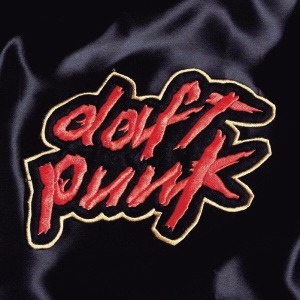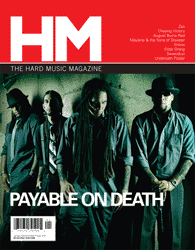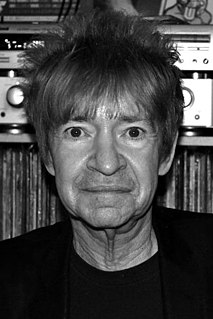
Disco is a genre of dance music and a subculture that emerged in the 1970s from the United States' urban nightlife scene. Its sound is typified by four-on-the-floor beats, syncopated basslines, string sections, horns, electric piano, synthesizers, and electric rhythm guitars.
A fanzine is a non-professional and non-official publication produced by enthusiasts of a particular cultural phenomenon for the pleasure of others who share their interest. The term was coined in an October 1940 science fiction fanzine by Russ Chauvenet and first popularized within science fiction fandom, and from there it was adopted by other communities.
House is a genre of electronic dance music characterized by a repetitive four-on-the-floor beat and a typical tempo of 120 to 130 beats per minute. It was created by DJs and music producers from Chicago's underground club culture in the 1980s, as DJs from the subculture began altering disco songs to give them a more mechanical beat and deeper basslines.

Daft Punk were a French electronic music duo formed in 1993 in Paris by Guy-Manuel de Homem-Christo and Thomas Bangalter. Widely regarded as one of the most influential acts in dance music history, they achieved popularity in the late 1990s as part of the French house movement. They garnered critical acclaim and commercial success in the years following, combining elements of house music with funk, techno, disco, indie rock and pop.
Chicago house refers to house music produced during the mid to late 1980s within Chicago. The term is generally used to refer to the first ever house music productions, which were by Chicago-based artists in the 1980s.

Melody Maker was a British weekly music magazine, one of the world's earliest music weeklies, and—according to its publisher IPC Media—the earliest. It was founded in 1926, largely as a magazine for dance band musicians, by Leicester-born composer, publisher Lawrence Wright; the first editor was Edgar Jackson. In January 2001, it was merged into "long-standing rival" New Musical Express.

Homework is the debut studio album by the French electronic music duo Daft Punk, released on 20 January 1997 by Virgin Records and Soma Quality Recordings. The duo produced the tracks without plans to release an album. After working on projects that were intended to be separate singles over five months, they considered the material good enough for an album.

Discovery is the second studio album by French electronic music duo Daft Punk, released internationally 12 March 2001 by Virgin Records. It marks a shift from the Chicago house sound prevalent on their first studio record, Homework (1997), to a house style more heavily inspired by disco, post-disco, garage house, and R&B. Comparing their stylistic approach to their previous album, band member Thomas Bangalter described Discovery as an exploration of song structures and musical forms whereas Homework was "raw" electronic music. He also described Discovery as a reflection of the duo's childhood memories, when they listened to music with a more playful and innocent viewpoint.

Roulé is a French record label founded in 1995 by former Daft Punk member Thomas Bangalter. Roulé has a side label entitled Scratché which to date has released only one record, produced by the Buffalo Bunch.
French house, also known as French touch, filter house and tekfunk, is a style of house music originally produced by French musicians in the 1990s. It was a popular strand of the late 1990s and 2000s European dance music scene and a form of Euro disco. The defining characteristics of the sound are heavy reliance on filter and phaser effects both on and alongside samples from late 1970s and early 1980s American or European disco tracks, causing thicker harmonic foundations than the genre's forerunners. Most tracks in this vein feature steady 4
4 beats with a tempo range of 110–130 beats per minute. French house tends to be confused with a genre known as future funk, although they are not the same genre. Purveyors of French house include Daft Punk, Stardust, Cassius, The Supermen Lovers, Modjo and Étienne de Crécy.

"Acid Tracks" is a 1987 acid house song by Phuture produced by Marshall Jefferson and released by Trax Records. Phuture consisted of Nathan Pierre Jones, better known as DJ Pierre, Earl Smith Jr, and Herbert Jackson. Jones had been interested in developing dance music and became superficially interested in house music after Spanky had taken him to see DJ Ron Hardy perform in Chicago. The trio began developing tracks without finding anything that they felt was satisifying; Jones had heard a track made on the unpopular Roland TB-303 bass machine, which led the group to purchase one.

"Around the World" is a song by the French electronic music duo Daft Punk. The song was written by the duo and released as the second single from their debut studio album, Homework (1997), in April 1997. It became a major club hit around the world and reached number one on the dance charts in Canada, the United Kingdom, and the United States. It also peaked at number one in Iceland and Italy. The song's only lyrics are "around the world," said 144 times. The music video was directed by Michel Gondry and choreographed by Blanca Li. In October 2011, NME placed it at number 21 on its list "150 Best Tracks of the Past 15 Years".
Plump DJs are an English dance music duo consisting of Lee Rous and Andy Gardner, considered to be early pioneers of the breakbeat genre in late 1990s. Throughout the 2000s, they have been very prolific creatively, releasing many celebrated underground singles, albums compilations. Also remixing the records of well-known dance music mega stars such as Deadmau5, Mark Ronson, Fatboy Slim, Orbital and the Stanton Warriors. They cemented their international status through their 10-year residency at London's famous superclub Fabric, in a career that has taken the duo to the largest stages on all four corners of this earth to perform.

HM Magazine is a monthly, digital and print on demand publication focusing on hard music and alternative culture of interest to Christians. It is headquartered in Houston, Texas. The magazine states that its goal is to "honestly and accurately cover the current state of hard music and alternative culture from a faith-based perspective." It is known for being one of the first magazines dedicated to covering Christian metal. The magazine's content includes features; news; album, live show and book reviews, culture coverage and columns. HM's occasional "So and So Says" feature is known for getting into artists' deeper thoughts on Jesus Christ, spirituality, politics and other controversial topics.
Nu-disco is a 21st-century dance music genre associated with a renewed interest in the late 1970s US disco, synthesizer-heavy 1980s European dance music styles, and early 1990s electronic dance music. The genre was especially popular in the first half of the 2000s, and experienced another mild resurgence through the 2010s.
Post-disco is a term to describe an aftermath in popular music history circa 1979–1985, imprecisely beginning with an unprecedented backlash against disco music in the United States, leading to civil unrest and a riot in Chicago known as the Disco Demolition Night on July 12, 1979, and indistinctly ending with the mainstream appearance of new wave in 1980. Disco during its dying stage displayed an increasingly electronic character that soon served as a stepping stone to new wave, old-school hip hop, euro disco, and was succeeded by an underground club music called hi-NRG, which was its direct continuation.

A nightclub is an entertainment venue during nighttime comprising a dance floor, lightshow, and a stage for a disc jockey (DJ) where a DJ plays recorded music.

Rodney Bingenheimer is an American radio disc jockey who is best known as the host of Rodney on the ROQ, a radio program that ran on the Los Angeles rock station KROQ from 1976 to 2017. In the early 1970s, he also managed a Los Angeles nightclub called Rodney Bingenheimer's English Disco.

Alexander Ridha, better known by his stage name Boys Noize, is a Berlin-based German-Iraqi electronic music record producer, songwriter, and DJ. It is similar to the name of Ridha's label, Boysnoize Records, which he established in 2005. Ridha has remixed the work of a number of other artists, including Snoop Dogg and Depeche Mode. In 2019, he produced Frank Ocean's song "DHL".

DJing is the act of playing existing recorded music for a live audience.













